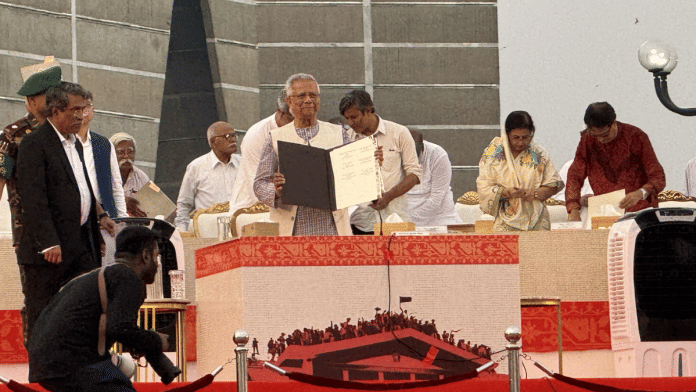New Delhi: Bangladesh interim leader Muhammad Yunus has declared the “birth of a new Bangladesh” as 25 political parties signed the July National Charter, even as violent clashes erupted outside Parliament and his one-time student allies refused to sign the document.
The charter, drafted after months of negotiations by the Yunus-led National Consensus Commission, seeks sweeping reforms to Bangladesh’s political, legal, and constitutional systems following the ouster of former Prime Minister Sheikh Hasina in August 2024.
“It’s the birth of a new Bangladesh,” Yunus said Friday at the signing ceremony held at the South Plaza of the Jatiya Sangsad. “The nation is indebted to the July fighters,” he added, referring to the demonstrators whose protests last year toppled Hasina’s Awami League government.
The July National Charter, named after last year’s mass uprisings, outlines a roadmap for political and institutional reform, including constitutional amendments and the creation of new oversight bodies. It was signed by major parties, including former Prime Minister Khaleda Zia’s Bangladesh Nationalist Party (BNP) and several like-minded allies.
In the presence of the Chief Adviser of the Interim Government and Head of the National Consensus Commission, Professor Muhammad Yunus, representatives of political parties signed the July National Charter today, Friday, at the South Plaza of the National Parliament.
Photos: CA… pic.twitter.com/XDH322cRVE
— Chief Adviser of the Government of Bangladesh (@ChiefAdviserGoB) October 17, 2025
However, Yunus’ message of renewal was overshadowed by renewed tensions with the National Citizen Party (NCP)—the student-led group that spearheaded last year’s uprising—boycotting the ceremony as it alleged that the charter lacked “legal basis.”.
NCP convenor Nahid Islam said Thursday that “some political parties are signing the document in the name of national consensus by defrauding the people.”
The country’s largest Islamist group, Jamaat-e-Islami, also withheld its signature, saying it is still reviewing the charter’s provisions.
Hours before the signing, the National Consensus Commission announced a last-minute amendment to the document: compensating the “July fighters” for their role in the 2024 uprising and incorporating references to the “fascist Awami League” and alleged crimes committed by law enforcement officials during Hasina’s rule, according to local reports.
Despite these changes, protests erupted outside the Parliament complex, where demonstrators —many identifying as families of the July uprising’s victims—demanded state recognition, legal protection, and rehabilitation. Police responded with tear gas, batons, and sound grenades after protesters refused to disperse. Witnesses reported several injuries and the vandalisation of police vehicles and tents.
BNP Standing Committee member Salahuddin Ahmed, meanwhile, hailed the charter as the beginning of a “new journey,” saying it would establish “strong democratic institutions” and “constitutional balance” among state organs. He also urged parties that had not yet signed — including the NCP — to reconsider, saying “the opportunity remains open.”
The charter’s signing came a day after the International Crimes Tribunal (ICT) prosecutors sought the death penalty for Sheikh Hasina over her alleged role in protest-related killings during the 2024 uprising.
The ICT, originally established in 2009 to try those responsible for the 1971 Liberation War atrocities, was reconstituted in 2024 by the interim Yunus administration following Hasina’s resignation. The revamped tribunal, now with six judges and two benches, has been tasked with prosecuting those accused of orchestrating the killings of July protest
In July, the tribunal formally indicted Hasina on charges of crimes against humanity. The charges stem from the government’s response to the widespread anti-government demonstrations in July and August 2024.
Hasina has been in exile in India since 5 August 2024, when her nearly 16-year tenure ended due to the protests. In December 2024, the Bangladesh interim administration sent a diplomatic note to India, requesting her extradition. The Ministry of External Affairs, India, confirmed the note but has not responded so far.
(Edited by Tony Rai)
Also Read: Bangladesh’s soil will never be used against India, says Dhaka’s new envoy in Delhi






